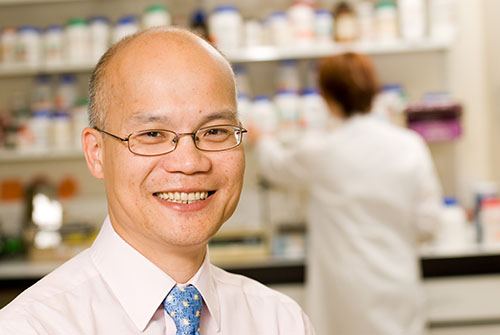We're pioneering new treatments for prostate cancer
A bold new treatment for prostate cancer could soon be available by repurposing an existing drug.
Prostate cancer is the most common cancer in men and kills 12,000 every year in the UK.
Currently, docetaxel is the main chemotherapy drug used to treat prostate cancer. But many patients end up developing resistance to the drug and their cancer returns.
Now, new research from the University of Glasgow and the Cancer Research UK Beatson Institute has uncovered that a cheap medicine, commonly used to treat a parasitic worm infection, can also effectively tackle prostate cancer when used in conjunction with docetaxel.
The drug is called mebendazole. It was identified after the researchers tested around a thousand existing medicines to ascertain if any could be repurposed against prostate cancer.
The study found that mebendazole enhanced the ability of docetaxel to kill prostate cancer cells and abolish tumour growth in mouse models of prostate cancer.
Mebendazole and docetaxel work together to kill prostate cancer cells by disrupting the molecular scaffold used by cells to divide. This scaffold is vital for cancer cells to grow and divide and so without it the cancerous cells die.

Prostate cancer cells stained with Coomassie blue dye
Drug repurposing in this way is advantageous as existing drugs already have satisfactory safety records. They can therefore be fast-tracked to treat the new disease.
Dr Linda Rushworth, researcher at the Institute of Cancer Sciences, University of Glasgow, worked on the study:
"Mebendazole and docetaxel have been well tested in patients and, since the safety of both drugs has already been determined, the timescale from lab to clinic is significantly reduced."
It is also cost effective. Mebendazole is on the World Health Organisation's list of essential medicines and costs less that £2 per pill from a pharmacist.

Professor Hing Leung, Professor of Urology and Surgical Oncology at the University of Glasgow, led the study.
"We are currently developing a clinical study design that will be able to determine the best dose and administration schedule to be used along with doxetaxel. The aim would be to allow the drugs to work together while producing the lowest side effects. Once this is shown to be effective in treating prostate cancer, the combination treatment could be adopted widely in patients with prostate cancer.
We think that this could be available to patients within three to four years."
Dr Helen Rippon, Chief Executive of Worldwide Cancer Research:
"This research could be a real game-changer for prostate cancer patients. Docetaxel is the main chemotherapy used to treat prostate cancer, but many patients end up developing resistance to the drug and their cancer comes back.
This bold new idea shows how we can use already existing medicines to bolster the effects of chemotherapy and hopefully improve outcomes for people with prostate cancer. We are excited to follow the progress of the research team as they take their work forward into clinical trials."
Dr Samuel Godfrey, Senior Research Information Manager at Cancer Research UK:
"Combining existing medicines with different cancer drugs is an exciting area of research, and this study shows some promising results which could lead to improved treatments for prostate cancer.
Out of the hundreds of medicines investigated, few would have suspected that an inexpensive worming treatment could so drastically increase cancer cell death in the lab. The next step will be to test this new drug combination in people with prostate cancer to see if it's safe and performs better than current treatments"
Discover more
Read the paper

